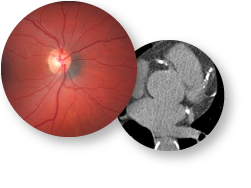
Research Data
An extensive set of study data is collected from CRIC Study participants. With varying frequency, data are collected in the domains of medical history, physical measures, psychometrics and behaviors, biomarkers, genomics/metabolomics, as well as renal, cardiovascular and other outcomes. Examples of data elements collected in the CRIC Study are provided below.
Biomarkers
- Laboratory Results (CBC)—[LABCBC]
- Proteomics Specimen Transfer—[PROTRANS]
- Proteomics Specimen Transfer Reduced Collection—[PROTRANS_R]
- Specimen Collection—[SPECIMEN]
- Specimen Collection 70 cc—[SPEC70]
Eligibility
Genomics
- Laboratory Results (CBC)—[LABCBC]
- Proteomics Specimen Transfer—[PROTRANS]
- Proteomics Specimen Transfer Reduced Collection—[PROTRANS_R]
- Specimen Collection—[SPECIMEN]
- Specimen Collection 70 cc—[SPEC70]
Medical History
- Concomitant Medications—[CMED]
- Demographic Information—[DEMO]
- Medical Event Questionnaire—[EVENTSII]
- Medical History—[MEDHXII]
- Medical History Update—[MEDHXUPIII]
Outcomes - CVD
- Medical Event Questionnaire—[EVENTSII]
Outcomes - Renal
- Kidney Census—[KCENSUS]
- Kidney Disease and Quality of Life—[KDQOL]*
- Medical Event Questionnaire—[EVENTSII]
- Renal Replacement Therapy Follow-Up Survey—[RRTFUP]
- Renal Replacement Therapy Primary Survey—[RRTPRIM]
- Renal Replacement Therapy Hemodialysis Data—[RRTHD]
- Renal Replacement Therapy Peritoneal Dialysis Data—[RRTPD]
Outcomes - Other
- Buschke Selective Reminding Test (SRT)—[SRT]*
- Buschke SRT Recall—[SRTREC]*
- Census Block Group Information (J. Lash)—[CBG]
- Diet History Questionnaire—[DHQ]
- Encryption Information—[ENCRP]
- Language Translation Information (Spanish-speaking)—[LANGUAGEII]
- Participant Assignment—[ASSIGNII]
- Short Test of Functional Health Literacy in Adults—[STOFHLA]*
- Trails A—[TRAILS_A]*
- Trails B—[TRAILS_B]*
Physical Measures
- Amputation Information—[AMPUT]
- Balance Testing—[BALANCE]
- Blood Pressure Form—[BP]
- Electrocardiograph Transfer—[ECGTRANS]
- Fracture Questionnaire (entry into Phase III)—[FRACTURE]
- Fracture Update Questionnaire—[FRACTFUP]
- General Health Questionnaire Frailty—[HEALTH]
- Hand Grip Dynamometer Frailty—[GRIP]
- Modified Mini-Mental State Exam—[MMSE]*
- Physical Activity—[PHYACT]
- Physical Assessment—[PHYASSESS]
- Physical Performance Testing Frailty—[PERFORM]
- Symptoms List—[SXLIST]
PRN
- Ancillary Studies: Participation Information—[ANCILLRY]
- Clinic Visit Status—[VISIT]
- CRIC Study Re-consent Status—[CONSENTII]
- Diet History Questionnaire Status—[DHQSTAT]
- Immediate Alert—[ALERT_I]
- Missed Visit Information—[MISSVST]
- Participant Close-out—[PTCL]
- Prescreening Information—[PRESCR]
- Prescreening Refusal—[PREREF]
- Procedural or Unanticipated Problems—[PUP]
- Proxy Information—[PROXY]
- Supplemental Consent Tracking—[SUPP]
- Urgent Alert—[ALERT_U]
- Withdrawal—[WITHDR]
Psychometrics & Behaviors
- Adult Access to Health Care & Utilization—[HCARE]
- Buschke Selective Reminding Test (SRT)—[SRT]*
- Buschke SRT Recall—[SRTREC]*
- Kidney Disease and Quality of Life—[KDQOL]*
- Lubben Social Network Scale—[LUBBEN]
- Modified Mini-Mental State Exam—[MMSE]*
- Self-Efficacy Questionnaire—[EFFICACY]
- Short Test of Functional Health Literacy in Adults—[STOFHLA]*
- Trails A—[TRAILS_A]*
- Trails B—[TRAILS_B]*
Baseline Demographic & Clinical Characteristics of CRIC Participants by Recruitment Phase
*Licensed Standard Instruments not available for public view/download
